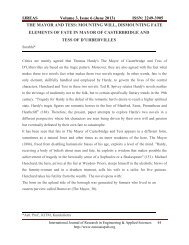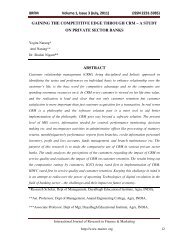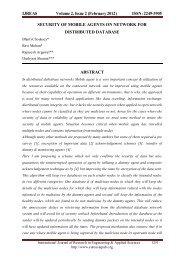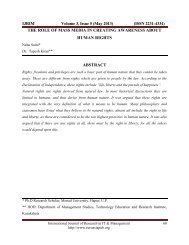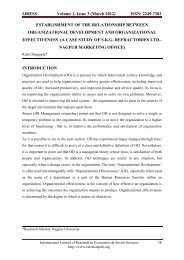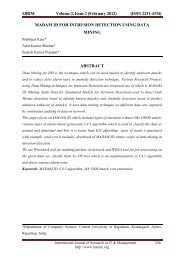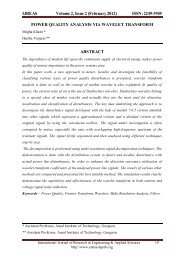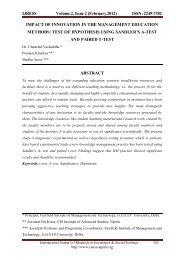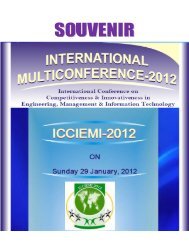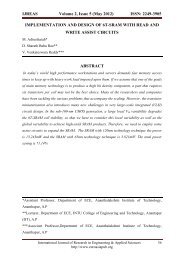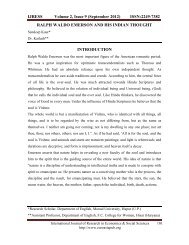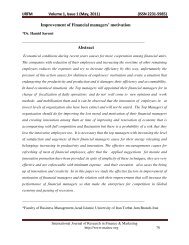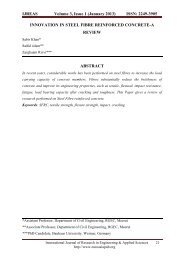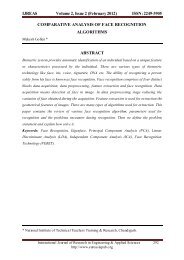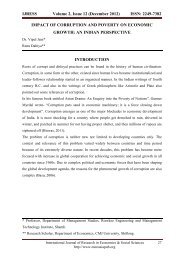A RELATIONSHIP BETWEEN ORGANISATIONAL ... - Euroasiapub.org
A RELATIONSHIP BETWEEN ORGANISATIONAL ... - Euroasiapub.org
A RELATIONSHIP BETWEEN ORGANISATIONAL ... - Euroasiapub.org
Create successful ePaper yourself
Turn your PDF publications into a flip-book with our unique Google optimized e-Paper software.
IJRFM Volume 1, Issue 2 (June, 2011) (ISSN 2231-5985)<br />
human efforts and friction’s with an animating spirit of co-operation and with proper regard<br />
for the genuine well-being of all members of the <strong>org</strong>anization.<br />
The Encyclopaedia Britannica explains that,” The concept Industrial Relations has been<br />
extended to denote the relations of the State with employers, workers and their <strong>org</strong>anizations.<br />
The subject, therefore, includes individual relations and joint consultation between employers<br />
and workers at their work place, collective relations between employers and their<br />
<strong>org</strong>anizations and trade unions and part played by the State in regulating these relations”.<br />
Industrial Relation is thus, the relation created at different levels of the <strong>org</strong>anization by the<br />
diverse, complex and composite needs and aspirations and attitudes and approaches among<br />
the participants. It is a highly complex and dynamic process of relationship involving not<br />
only employees and management’s, but also their collective forums and the State. In an<br />
<strong>org</strong>anization, these relationships may be personal and informal at one end, and may be highly<br />
institutional with legally prescribed structures and procedures at the other end.<br />
RESPONSIVE <strong>ORGANISATIONAL</strong> CULTURE & INDUSTRIAL<br />
RELATIONS IN THE CHANGING SCENARIO<br />
The changes in international economic order and geo-political environment in wake of the<br />
breaking of the Berlin wall, transition in Central and East European countries and the end of<br />
cold-war, changes in macro-economic and social environment, technological and structural<br />
changes, worker profile (Sengupta, 1992) call for fresh perspectives on our thinking, our<br />
beliefs, our philosophy, our value system connecting the management of people at workplace<br />
and elsewhere. The dynamic change process warrants a fresh look at the institutional and<br />
legal frame work and also the roles of the principal actors (Venkatratnam, 1996). The labour<br />
management relations in India has been characterize by predominance of adversarialism, the<br />
general lack of mutual trust and understanding, communication gap and win-lose orientation.<br />
India’s IR systems and practices have much room for improvement more especially in the<br />
context of strengthening competitiveness and efficiency of Indian industries to facilitate their<br />
integration with global economy (Guha, 1994).<br />
Issues relating to structural flexibility, multi-skilling, continuous learning, shared norms will<br />
have to be incorporated in the main agenda of Industrial Relations. Trade unions are as much<br />
affected by the emergent paradigm as the management. The emergence of new breed of<br />
knowledge workers, their changed profile will necessitate the trade unions to broaden their<br />
scope of operations, democratize their processes and be flexible enough to meet their<br />
International Journal of Research in Finance & Marketing 53<br />
http://www.mairec <strong>org</strong>



